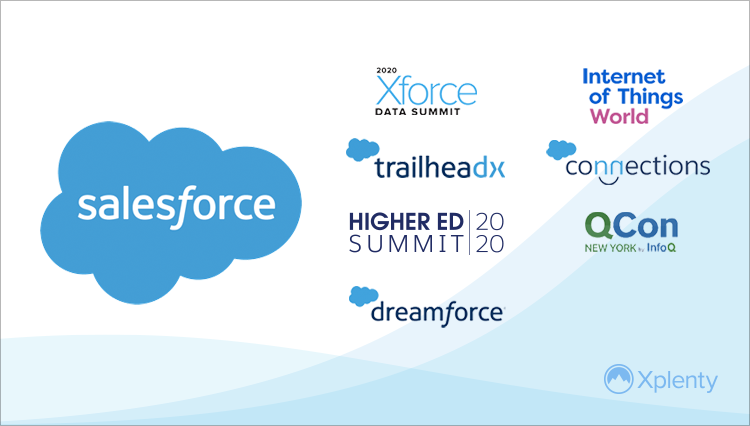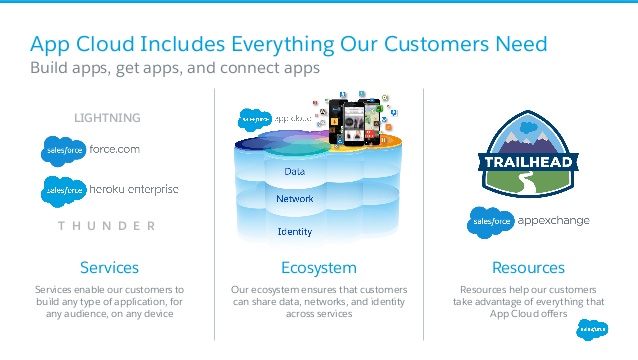
What makes an app not native in Salesforce?
Being built on the Force.com establishes the software structure which allows other Salesforce solutions to connect readily with the app. If the application is not coded in Apex and Visualforce or doesn’t make use of Lightning web components, it’s probably not native.
Is it better to go native or integrate with Salesforce?
If the answer is the majority or many, then it could be a native app but difficult to integrate with. Going native is everything when it comes to achieving a seamless, cohesive business process on a single platform. Besides avoiding hidden costs like integration maintenance, you get more value out of your Salesforce stack.
What is Salesforce cloud?
Salesforce was a pioneer in delivering cloud-based software. Some of the world’s largest companies moved their applications to the cloud with Salesforce after rigorously testing the security and reliability of our infrastructure.
Can I integrate a non-native application to the Salesforce CRM?
While you can integrate a non-native application to the Salesforce CRM, this tends to be riskier than just using native apps; this is because connecting a non-native application to your Salesforce Platform will require one or several integration points to your Salesforce solution, just to allow the two systems to communicate.
See more

Is Salesforce a cloud application?
Salesforce is the leader in cloud computing, offering applications for all aspects of your business, including CRM, sales, ERP, customer service, marketing automation, business analytics, mobile application building, and much more. And it all works on the same, connected platform, drawing from the same customer data.
What are examples of cloud native applications?
4 examples of cloud-native applicationsSoftware containers. Software containers are portable, integrated operating environments encompassing an application and all the software components needed to run it. ... Microservices. ... Software-defined infrastructure. ... Application program interfaces (APIs)
What is considered cloud native?
A cloud-native application is a program that is designed for a cloud computing architecture. These applications are run and hosted in the cloud and are designed to capitalize on the inherent characteristics of a cloud computing software delivery model.
What is difference between cloud native and cloud?
Cloud-based: Applications are tightly integrated, and upgrades may be needed for the entire stack, causing downtime. Cloud-native: Faster to deploy because there is no hardware or software to deploy. Cloud-based: Slower because of hardware provisioning or software setup.
What is meant by cloud native application?
The term cloud native refers to the concept of building and running applications to take advantage of the distributed computing offered by the cloud delivery model. Cloud native apps are designed and built to exploit the scale, elasticity, resiliency, and flexibility the cloud provides.
What is cloud native AWS?
Cloud native architecture is a design methodology that utilizes cloud services such as EC2, S3, Lambda from AWS, etc to allow dynamic and agile application development techniques that take a modular approach to building, running, and updating software through a suite of cloud-based microservices versus a monolithic ...
Are Azure clouds native?
Build your cloud-native apps with Azure fully managed services, seamlessly integrated development tools and built-in, enterprise-grade security. Use the tools and technologies of your choice, while implementing a microservices-based, cloud-native architecture that makes it easier to develop and scale your applications.
What is the opposite of cloud-native?
The polar opposite of cloud native applications are 1980's, monolithic mainframe applications or your 1990's client-server applications. These could be migrated to the cloud as-is, but the chances of them working are unknown, whereas the missed opportunity of being able to exploit cloud features is known.
What is cloud-native SaaS?
So what is cloud-native SaaS? Software-as-a-Service (SaaS) that is developed, designed and deployed as cloud-native applications (aka cloud-native SaaS) are composed of several independent services - or in other words, they are built using composable architecture.
What is the difference between cloud-native and microservices?
Cloud-native is about more than just microservice -- distributed infrastructure and consumable services are also important parts of the equation. However, microservices are arguably the most important element of a cloud-native strategy. That said, cloud-native microservices don't have to run in the cloud.
What are characteristics of cloud-native applications?
Cloud-native architectures is the conjunction of three attributes - Microservices architectures, container-based applications and dynamic orchestration of compute, storage, and networking resources.
Are containers cloud-native?
Containers, part of a more general software approach called cloud-native, are a response to these demands. They are small software packages which, ideally, perform a small, well-defined task. Container images include all the software, including settings, libraries, and other dependencies, needed for them to run.
What is Salesforce1 app?
The Salesforce1 mobile app lets you see, and act on, all your business data, and communicate with coworkers and clients. Access CRM, ERP and custom app data on a single app.
What is one platform, one truth?
One platform, one truth. All your apps living on one platform means a single version of the truth. Compliance and audits are a breeze with automated audit trails, documentation and associated conversations. Anyone can see what’s happening with a customer all in one central location. SCHEDULE DEMO WATCH DEMO.
What is cloud based service?
Cloud-based services are used for processes like accounting, inventory control, human resources, and customer relationship management.
Why is cloud service important?
Cloud services are delivered over the internet, so it’s important to have fast, reliable, secure service with enough capacity to accommodate your business’ needs. Bandwidth is a core component of cloud services. If your network specs are insufficient, consider upgrading.
Why do vendors use two factor authentication?
Cloud vendors like Salesforce use two-factor authentication to confirm a user’s identity to prevent data breaches. Misconception: Customers don’t trust businesses that use the cloud. ✅Fact: Customers already trust the cloud, as well as businesses that use the cloud.
What is IaaS cloud?
IaaS is the most open-ended type of cloud service for organizations that want to do a lot of customization themselves. The greatest benefit of IaaS is extra capacity, which can be accessed on demand for long-term or short-term needs. IaaS makes it possible for tech-savvy businesses to rent enterprise-grade IT resources and infrastructure to keep pace with growth, without requiring large capital investments.
What is SaaS cloud computing?
SaaS is the most common type of cloud computing. It delivers complete, user-ready applications over the internet. These typically do not have to be downloaded and installed on each individual user’s computer, saving technical staff lots of time. Maintenance and troubleshooting are handled entirely by the vendor.
When was the internet a cloud?
By the early 1990s, the internet was depicted as a cloud in patent diagrams. It wasn’t until 1996, when Compaq Computer Corporation used the term in a business plan, that the phrase was coined. It didn’t take long for Salesforce.com to become a pioneer in cloud-based computing.
Is cloud computing a business?
Over the past two decades, cloud computing has become a staple in business and private life. As tech-savvy businesses can attest, there are many benefits of cloud computing. Among the most important, cloud computing is:
Being Native: Why is there so much confusion?
There’s a lot of confusion in the Salesforce marketplace as to what constitutes a native application. We’ve encountered many prospects who think they are reviewing native Salesforce applications when in fact they aren’t. Why does this happen?
How does Integration relate to Native Applications?
Consolidating your business tools on a single platform is more efficient – a major reason why, is because you can avoid complicated integrations to non-native software.
5 Characteristics of Native Applications
Not sure if an application is native to Salesforce? Here are 5 ways you can tell.
Summary: The Benefits of Using Native Applications
Going native is everything when it comes to achieving a seamless, cohesive business process on a single platform. Besides avoiding hidden costs like integration maintenance, you get more value out of your Salesforce stack.
About Accounting Seed
At Accounting Seed, we leverage our native connection to streamline your financial workflow while giving you full visibility of your quote-to-cash process. Be sure to check out our blog for great resources on accounting, technology, and other trending topics. And of course, feel free to reach out to us with questions or to try a free demo!
